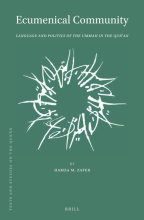Hamza M. Zafer, Ecumenical Community: Language and Politics of the Ummah in the Qurʾan (Leiden: Brill, 2020)
Presenting a close reading of the Quran’s communitarian rhetoric, Ecumenical Community is a major contribution to Quranic Studies with its philologically rich, historically critical perspective. Zafer traces the limited deployment of the term Ummah or "community" in Quranic texts including Surat al-Baqarah. He argues that these texts are evidence of a formative period of growth in the early Muslim religio-political movement. As a self-identifying communal term, the Ummah represented an arbitrational community—a collective formed through the shared recognition of the Prophet's authority as an arbitrator (ḥakam) of differences. As such, the Ummah had porous, outwardly expanding boundaries and an ecumenical orientation that allowed it to subsume but not efface pre-existing class, clan, and customary groupings.
Along with an introduction and conclusion, Ecumenical Community consists of four chapters. The first chapter, “The Ummah and Collectivity,” reconstructs the urban and mercantile setting of the early Muslims in seventh-century western Arabia. The second chapter, “The Ummah and Class,” explores how the Quran's communitarian rhetoric addressed material disparities and power differentials in the in-group. The third chapter, “The Ummah and Clan,” describes Quranic anti-patrimonialism and explains how the Ummah evaded clan-based boundaries. The fourth chapter, "The Ummah and Custom" examines how Quranic communitarianism was inclusive of ritual and customary diversity in its historical environment.
Ecumenical Community employs different innovative methodologies in the study of the Quranic text, including, (1) New Biblicism, which gleans the Quran’s interpretive positions in relation to Syriac, Ethiopic, Greek, and Aramaic exegetical literatures from the first millennium, (2) New Textualism, which connects the Quran’s literary structure and rhetorical style to the historical development of the early Muslim community and its hermeneutic practices, and (3) New Historicism, which situates the Quran within the broader discursive world of the Hellenized Near East, a world characterized by the emergence of vast political formations and ecumenical empires.
Ecumenical Community has been praised by reviewers not only for its innovative approach to the formation of the early Muslims, but also for the economical and eloquent way it engages a vast number of primary sources and modern scholarship to produce ground-breaking research.
The cover art for Ecumenical Community features calligraphy by the American Muslim artist Lubna Zahid. The composition is a circular repetition of the Quranic word mīzān, which means balance.
